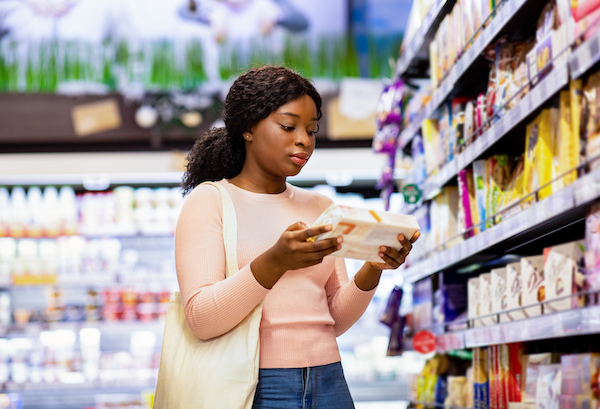
Sustainability is just good business for food and grocery (F&G) brands, especially those that want to appeal to younger consumers. According to the U.S. Brand Sustainability Benchmark Report from research technology company Glow and global information services company NIQ, 1 in 2 consumers have changed F&G brands based on perceptions of the brand’s ESG (environmental, social, and governance) performance. Not only that, but sustainability is one reason consumers, and Millennials in particular, don’t trade down for less expensive products.
The report showed that sustainability is a growing consideration for F&G purchase decisions. Nearly all (92%) survey respondents said sustainability is important, up from 69% two years ago. And 85% say it’s important for businesses to act responsibility when it comes to society and the environment.
“When consumers think about sustainability, what is generally top of mind are environmental challenges born of packaging and waste management and concerns about ingredient/material sourcing and manufacturing practices,” Mike Johnston, Managing Director of Data Products at Glow, commented in an email Q&A. “All of these things have been on our minds continuously over the last few years due to the climate crisis, Covid-19, mental health challenges, growing social inequality, and more.”
“In addition to receiving extensive media coverage, these concerns have become key topics for governments and boardrooms worldwide,” Johnston continued. “As a result, consumers are more aware of the issues at play and the need for governments, corporations, and individuals to all play a role in addressing them. One way consumers are increasingly doing their bit is by using their purchasing power to support businesses that are trying to be more sustainable.”
The data in the report support the idea that consumers are putting their beliefs into action:
- Half of consumers have started or stopped using a food or grocery brand because of the brand’s ESG behavior. This number goes up to 7 in 10 for Millennials and people with children.
- Consumers switch to the top ESG performing brands at twice the rate of the average for all brands.
And this behavior has real bottom-line impacts. Using data from two separate studies, Glow found that a 2-point increase in the research technology company’s proprietary Social Responsibility Score (SRS) correlates with 1% additional revenue growth over 3 years.
The SRS is based on 13 ESG factors, from reducing plastic and waste to supplier welfare, to charity support. For F&G brands, the top three most important drivers to consumers are all environmental:
- Reducing emissions and climate change
- Respecting and protecting natural resources
- Protecting wildlife and ecosystems
On the whole, F&G is seen as a leader among industries. It ranks second, behind supermarkets and convenience stores. But there’s room for improvement. Glow reports that two-thirds (66%) of consumers have an opinion about the ESG credentials of brands they’re aware of and that Gen Z is the currently the least satisfied, rating brands as 14% lower overall compared to other generations.
Johnston notes that there are also some differences in what consumers expect of different departments. “For example, consumers are 5-10% less satisfied with brands in the Meat & Seafood department across all sustainability drivers versus the F&G industry overall. And the Beverage department scores lower (10% less satisfied versus F&G) when it comes to ‘Caring About My Health & Wellbeing.’”
The food brands that consumers perceive as the most socially and environmentally responsible are Cheerios and Quaker – the only two food and beverage brands to make the top 10 (the grocery brands included household, personal care, etc.).
Johnston said that the report captured open-ended feedback that provides insight into the brands’ ratings. “This feedback shows appreciation for Quaker’s is driven by the brand’s focus on health and nourishment of customers, commitment to community support, and attempts to reduce their environmental impact.” Quaker’s is associated with heart health and low sugar and salt content, as well as recognized for donating money and meals to help people experiencing food insecurity and having recyclable packaging. “The combination of these social and environmental elements ladders up to a strong overall consumer ESG score.”
Cheerios is also seen as having health benefits and supporting the environment and communities through initiatives like its bee conservation and box tops for education programs. “These elements have been strongly supported with clear on-pack information reinforcing the value of using packaging to communicate ESG efforts, especially those aligned to ingredients, sourcing, and packaging/waste management,” Johnston said.
These types of insights can help brands improve their own SRS scores and realize the financial benefits of doing so. “The F&G report is designed to be a starting point for brands to understand current and emerging consumer behavior and learn what consumers expect F&G brands to address in the ESG space,” Johnston said. “The report also provides unique benchmarking that allows brands to understand broadly the magnitude of opportunity or risk resulting from getting their sustainability strategy right or wrong. It is intended to provide context for brands to sense check their current approach and stimulate them to want to continue to evolve their programs so they can reap the benefits.”








